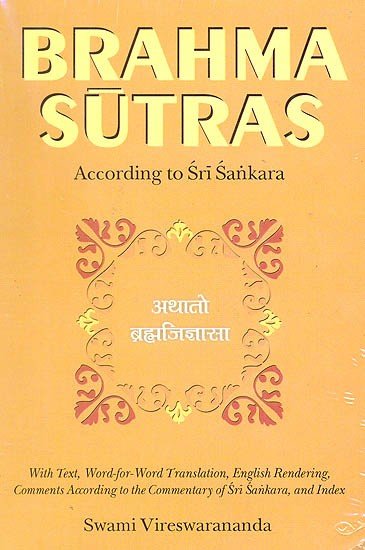Brahma Sutras (Shankara Bhashya)
by Swami Vireshwarananda | 1936 | 124,571 words | ISBN-10: 8175050063
This is the English translation of the Brahma-sutras including the commentary (Bhashya) of Shankara. The Brahma-sutra (or, Vedanta-sutra) is one of the three canonical texts of the Vedanta school of Hindu philosophy and represents an early exposition the Vedantic interpretation of the Upanishads. This edition has the original Sanskrit text, the r...
Chapter III, Section IV, Adhikarana XIII
Adhikarana summary: The subordinate members of sacrificial acts
Adhikarana XIII - The meditations connected with the subordinate members of sacrificial acts are to be gone through by the priest and not by the sacrificer.
Brahma-Sutra 3.4.44: Sanskrit text and English translation.
स्वामिनः, फलश्रुतेरित्यात्रेयः ॥ ४४ ॥
svāminaḥ, phalaśruterityātreyaḥ || 44 ||
svāminaḥ—To the sacrificer; phala-śruteḥ—from the declaration of results in the Sruti; iti—thus; ātreyaḥ—Atreya.
44. To the sacrificer (belongs the agentship in meditations), because the Sruti declares a fruit (for it); thus Atreya (thinks).
The question is raised as to who is to observe the meditations connected with subordinate members of sacrificial acts, whether it is the sacrificer or the priest. The opponent, represented by the sage Atreya, holds that it is to be observed by the sacrifices as the Sruti declares a special fruit for these meditations.
Sutra 3,4.45
आर्त्विज्यमित्यौडुलोमिः, तस्मै हि परिक्रीयते ॥ ४५ ॥
ārtvijyamityauḍulomiḥ, tasmai hi parikrīyate || 45 ||
ārtvijyam—The duty of the Ritvik (priest); iti—thus; auḍulomiḥ—Audulomi; tasmai—for that; hi—because; parikrīyate—he is paid.
45. (They are) the duty of the Ritvik (priest), thus thinks Audolomi, because he is paid for that (i.e. the performance of the whole sacrifice).
Since the priest is paid for all his acts, and thereby the fruit of all his acts is, as it were, purchased by the sacrificer, the meditations also come under this category and have to be observed by the priest and not the sacrificer. This is the view of the sage Audulomi.
Sutra 3,4.46
श्रुतेश्च ॥ ४६ ॥
śruteśca || 46 ||
śruteḥ—From the Sruti; ca—and.
46. And because the Sruti so declares.
“Whatever blessing the priests pray for at the sacrifice, they pray for the good of the sacrificer” (Sat. Br. 1. 8. 1. 26). Such texts declare that the fruit of meditations in which the priest is the agent, goes to the sacrificer. Therefore Audulomi’s view is correct, being supported by the Sruti texts.
